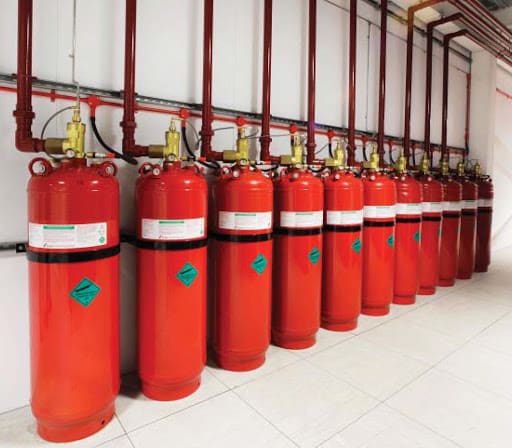When it comes to fire suppression and protection, there are a number of agents on the market. Each different fire suppression agent comes with a unique set of pros and cons, and each is suited for a variety of different fire classes. As fire protection specialists, we’re often answering questions about which fire suppression agent is best for which application, and one topic that comes up frequently is clean agents. Here’s everything you need to know about clean agents, from what they are to how they work:
What is a Clean Agent?
A clean agent is any type of fire extinguishing agent that is electrically non-conductive, volatile, or gaseous, and that does not leave a residue upon evaporation. Clean agent fire suppression systems make use of an inert gas or chemical that is stored in a container and discharged when a fire is detected.
This type of fire extinguishing agent gets its name, “clean”, from the fact that it doesn’t leave a residue, but also because most clean agents are significantly more environmentally friendly than other options.
How Do Clean Agents Work?
A fire can only occur when three elements are present: heat, oxygen, and a fuel source. If one element is not present or is blocked, the fire will be extinguished. Clean agents eliminate either the heat or the oxygen elements to extinguish the fire.
3 Common Clean Agents
There are a number of clean agent fire suppression systems on the market, but the three most common agents used for fire suppression are inert gases, FM-200, and Novec 1230. Let’s take a quick look at how these three different clean agents work to extinguish fires.
- Ansul Inergen: Ansul INERGEN is a clean agent that uses three inert gases — nitrogen, argon, and carbon dioxide. This clean agent works by lowering the oxygen content in a room below the level that supports combustion, while still allowing a person to breathe. This makes it an extinguishing agent that’s safe for the environment and for people.
- FM-200: This is a non-toxic, colorless gas that uses heat adsorption to extinguish fires. FM-200 removes the heat element of a fire, leaving no residue and ensuring that your assets and any occupants are kept safe.
- 3M Novec 1230: Novec 1230 is another colorless, non-toxic agent that is often used in applications with sensitive electronic equipment. This fluid safely extinguishes fires without disrupting critical, high-value assets, and it’s safe for people and the environment.
What Are the Benefits of Clean Agent Fire Suppression Systems?
Why should your business or organization consider choosing a clean agent fire suppression system? While all systems have pros and cons, clean agents are one of the most low-maintenance fire suppression systems. Here are just a few of the benefits of implementing a clean agent fire suppression system:
- Safety: Clean agents are non-toxic and non-corrosive. This means they’re safe to be used in environments where people are present.
- No Associated Damage: Since clean agent fire suppression systems don’t use water or powders, they don’t cause any damage. They’re safe to use in applications with sensitive technology, electronics, and high-value assets.
- No Cleanup: Clean agents don’t leave a residue. That means that after your system discharges, you don’t have to worry about extensive cleanup.
- Minimal Downtime: With no damage and no cleanup, its easy for you to get your business back on track.
- Fast Acting: Clean agent systems actuate in seconds. Since they extinguish fires effectively, most fire damage should be limited to a small area.
Understanding Clean Agents and The Environment
Many fire suppression agents are great for extinguishing fires, but not always the best for the environment. Some agents can contribute to ozone depletion, while others contain some toxic properties that aren’t safe for people or the planet. When it comes to clean fire suppression agents, it’s good to know that they are safe for the environment.
Clean agents have zero ozone depletion potential. They don’t affect the earth’s ozone layer, which means they’re safe to use without harming the environment. They’re also non-toxic and non-corrosive. Finally, most clean agents dissipate quickly, if not as soon as the fire is suppressed. With short atmospheric lifetimes, these agents don’t pollute the environment either.
Clean agents are an effective, and attractive fire suppression option for a variety of applications. If you’re interested in implementing clean agents, know that your choice will help protect our environment, while still keeping your facility safe. The Vanguard team would love to help you make the switch. Give us a call at 616-245-8719 or contact us online and we’ll set up a convenient time to go over the details.


